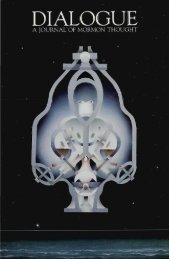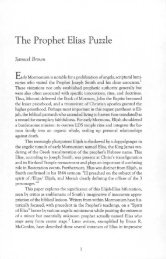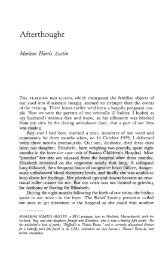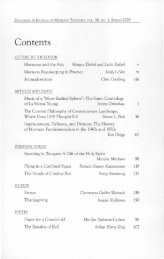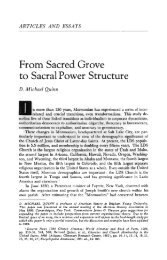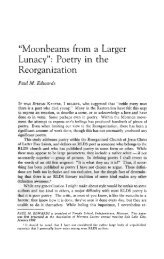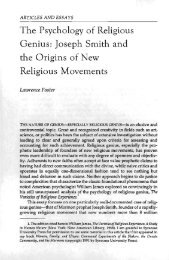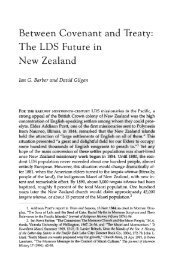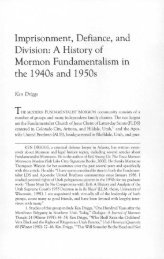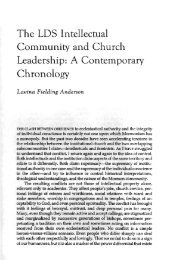Dialogue, Volume 25, Number 2 - Dialogue – A Journal of Mormon ...
Dialogue, Volume 25, Number 2 - Dialogue – A Journal of Mormon ...
Dialogue, Volume 25, Number 2 - Dialogue – A Journal of Mormon ...
Create successful ePaper yourself
Turn your PDF publications into a flip-book with our unique Google optimized e-Paper software.
Anderson: J e s u s W a n t s M e for ... 1 0 3<br />
Testament to indicate that Jesus expects children —or adults either —to<br />
be passive. He was on the move constantly — striding along the roads,<br />
responding to a call for help, checking the sycamore trees for undersized<br />
tax collectors — and it seems pretty clear to me that the people<br />
who benefited from his teachings were those who kept close to him by<br />
moving, even if they had to do some leg-stretching and panting.<br />
This organizational model also assumes that listening is learning.<br />
Concern with following the manual leads to the distressing spectacle <strong>of</strong><br />
teachers standing in front <strong>of</strong> the class, reading mechanical stories from<br />
the manual and asking equally mechanical questions from the<br />
"discussion" list. But what are the unintended messages that the children<br />
learn from these situations?<br />
Church is boring.<br />
My teacher doesn't like me enough to come every week.<br />
Sitting still is being reverent.<br />
Jesus loves me when I'm quiet.<br />
Learning about the gospel means listening to someone tell me things<br />
that are boring, tedious, and irrelevant.<br />
I have been dismayed and distressed to see how faithfully children<br />
model this adult behavior. Short talks presented by the older children<br />
nearly always consist <strong>of</strong> material mumbled and mispronounced from<br />
The Friend and even manuals. As a final point, the hierarchical domination<br />
<strong>of</strong> Primary is blinding because it trains adults to see the needs<br />
<strong>of</strong> the hierarchy rather than the needs <strong>of</strong> the children, those the hierarchy<br />
theoretically serves. All too <strong>of</strong>ten now, Primary is a place to<br />
warehouse children while the adults do adult things. What if we stood<br />
the problem on its head and, instead <strong>of</strong> asking, "What does the organization<br />
need?" asked instead, "What is best for the children?" Then<br />
Primary would be a present joy and a genuine investment in the<br />
future — a place to eliminate many <strong>of</strong> the problems that receive expensive<br />
and time-consuming attention during adolescence. Each Primary<br />
worker probably has a wish-list, but here are some items on mine <strong>of</strong> a<br />
child-centered Primary:<br />
1. The Primary president would be the ward's best executive.<br />
2. We'd have a schedule that included vigorous physical activity<br />
for ten minutes or so right after sacrament meeting instead <strong>of</strong> another<br />
twenty minutes <strong>of</strong> sitting still.<br />
3. Teaching candidates would be energetic, creative, experienced<br />
teachers. The Primary president would have her pick <strong>of</strong> the ward.<br />
Sweet young brides, shy converts, or people who are allowed to be undependable<br />
in their attendance and erratic in their performance can<br />
also grow from Primary callings, but the focus would remain on the<br />
children, rather than on the maturing adult. Teachers would be



